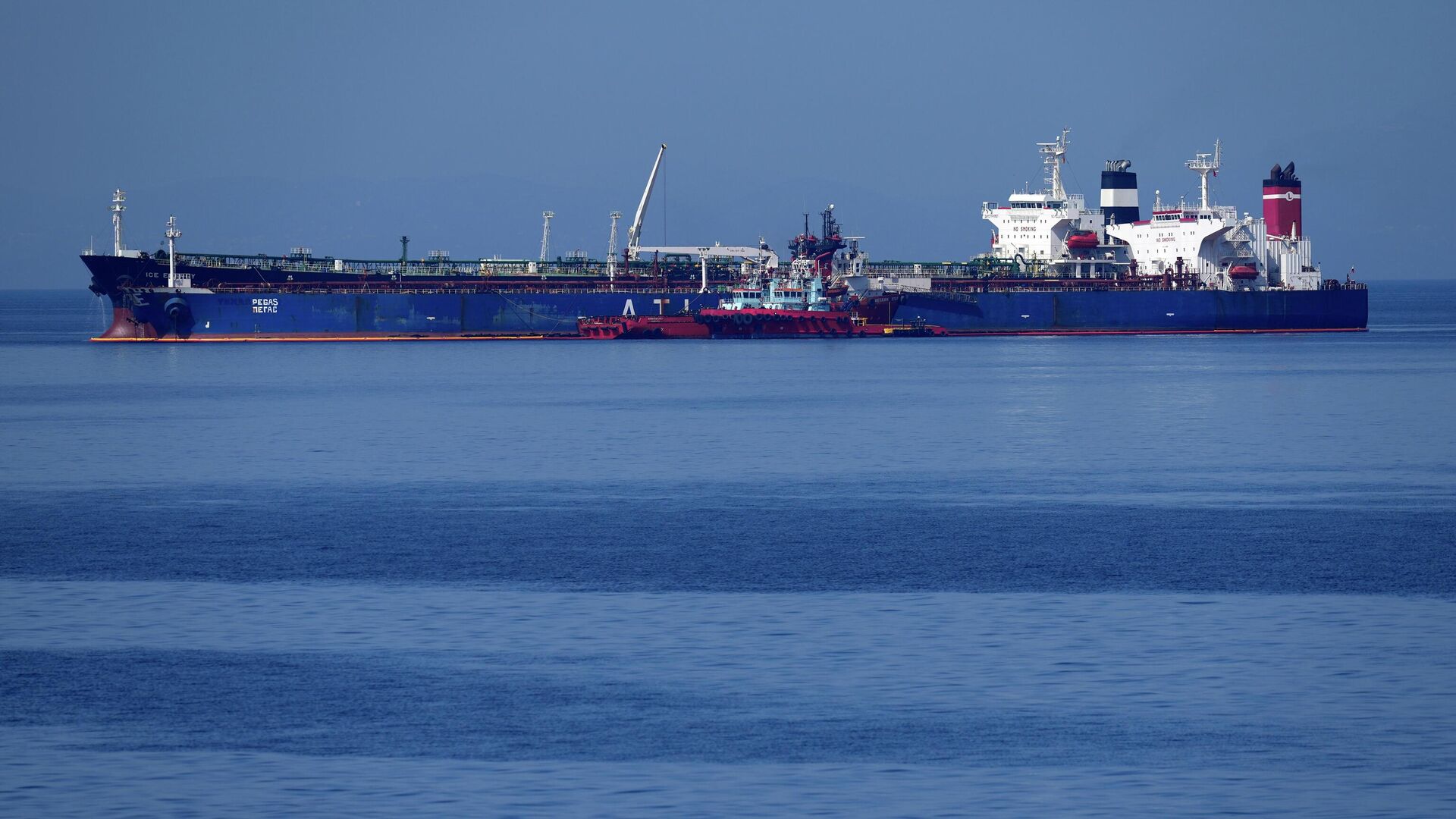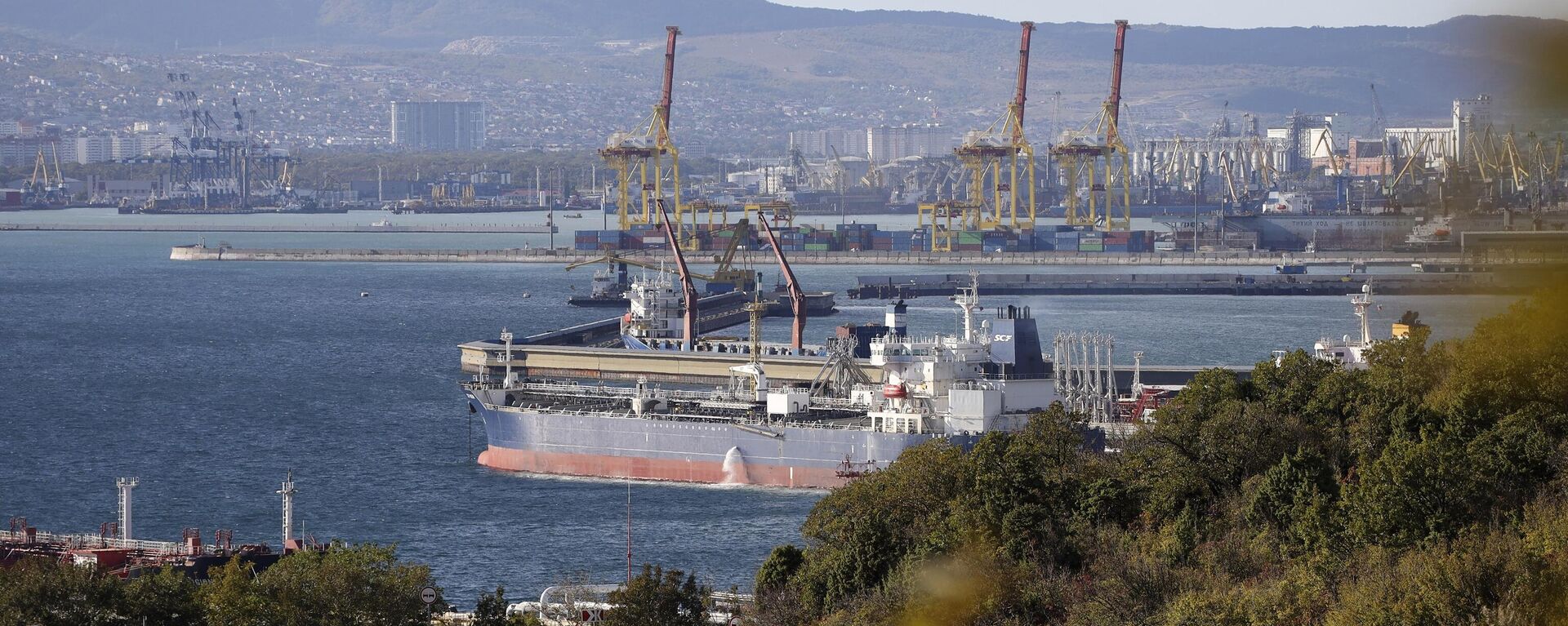https://sputnikglobe.com/20230907/russia-winning-war-against-wests-hot-air-oil-and-gas-sanctions-threat-1113183868.html
Russia Winning War Against West's 'Hot Air' Oil and Gas Sanctions Threat
Russia Winning War Against West's 'Hot Air' Oil and Gas Sanctions Threat
Sputnik International
The G7 has shown signs of ditching its artificial below-market price cap on Russian oil exports by. David Tawil suggested the policy had been "hot air" from the start, and that reality was dawning on Western leaders.
2023-09-07T21:09+0000
2023-09-07T21:09+0000
2023-09-07T21:07+0000
russia
oil
gas
natural gas
sanctions
us
analysis
https://cdn1.img.sputnikglobe.com/img/07e6/06/09/1096152406_0:0:3073:1728_1920x0_80_0_0_4360c668ed0dcd6f20caf63df4163b10.jpg
The West's attempt to punish Russia with a price limit on its oil exports has only exposed the G7 group as "a joke", a market expert underscored.Earlier this week, Russia and Saudi Arabia both announced an extension of their cuts to crude oil production until the end of the year.The revelation subsequently sent the market price of Urals crude to above $70 per barrel for the first time since last November — way above the $60 price cap the G7 group of industrialised countries attempted to impose on Russian exports by sea.David Tawil told Sputnik that he was unsurprised by the extension, given that it was driven by an economic slowdown in China.But with Saudi Arabia accepted into the BRICS group of emerging economies at its summit in South Africa last month — along with the United Arab Emirates, Iran, Argentina, Egypt and Ethiopia — the G7 is in danger of being relegated to second place in an increasingly multipolar world.Now, the G7 has reportedly postponed its review of the oil price cap, which was already at risk of collapse."Russia has very much been able to find ways around this cap. So all of this was a lot of hot air, but very little by way of substance," Tawil said. "Maybe it was just window dressing. Maybe it started with good intentions and an intention to actually do something. But really, they quickly realized that there wasn't going to be much by way of being able to enforce the policy that they wanted to go ahead and exact on Russia."He pointed out the G7 price cap had encouraged many firms to get into the Russian oil freighting market. Austrian Chancellor Karl Nehammer admitted this week that his country had no alternative but to import gas from Russia to fuel its economy and household heating and cooking needs.The pundit pointed out there were crucial differences in the supply of natural gas, compared to crude oil."There are alternatives and there are lots of producers around the world for oil, and you can go ahead and get it by tanker," he pointed out. "But natural gas becomes a real problem when the only pipes you've got come from Russia." "We're on our way into winter now, so I think European countries, Austria included, need to be careful with their words," Tawil said. "They certainly [do] not want to get into a natural gas war or embargo situation with Russia going into winter, because that could be catastrophic for the people of Austria and lots of other countries as well."For more insightful commentary on the top news stories, tune in to our Sputnik Radio show The Backstory.
https://sputnikglobe.com/20230712/russian-crude-oil-on-verge-of-busting-western-sanctions-price-cap-1111833289.html
russia
Sputnik International
feedback@sputniknews.com
+74956456601
MIA „Rossiya Segodnya“
2023
James Tweedie
https://cdn1.img.sputnikglobe.com/img/07e4/08/1c/1080307270_0:3:397:400_100x100_80_0_0_7777393b9b18802f2e3c5eaa9cbcc612.png
James Tweedie
https://cdn1.img.sputnikglobe.com/img/07e4/08/1c/1080307270_0:3:397:400_100x100_80_0_0_7777393b9b18802f2e3c5eaa9cbcc612.png
News
en_EN
Sputnik International
feedback@sputniknews.com
+74956456601
MIA „Rossiya Segodnya“
Sputnik International
feedback@sputniknews.com
+74956456601
MIA „Rossiya Segodnya“
James Tweedie
https://cdn1.img.sputnikglobe.com/img/07e4/08/1c/1080307270_0:3:397:400_100x100_80_0_0_7777393b9b18802f2e3c5eaa9cbcc612.png
g7 price cap on russian oil, russian gas exports to europe, western sanctions on russia
g7 price cap on russian oil, russian gas exports to europe, western sanctions on russia
Russia Winning War Against West's 'Hot Air' Oil and Gas Sanctions Threat
The G7 has shown signs of ditching its artificial below-market price cap on Russian oil exports. David Tawil, founder of ProChain Capital, has suggested the policy had been "hot air" from the start, and that reality was dawning on Western leaders.
The West's attempt to punish Russia with a price limit on its oil exports has only exposed the G7 group as "a joke", a market expert underscored.
Earlier this week, Russia and Saudi Arabia both announced an extension of their cuts to crude oil production until the end of the year.
The revelation subsequently sent the market price of
Urals crude to above $70 per barrel for the first time since last November — way above the $60 price cap the G7 group of industrialised countries attempted to impose on Russian exports by sea.
David Tawil told
Sputnik that he was unsurprised by the extension, given that it was driven by an economic slowdown in China.
But with Saudi Arabia accepted into the BRICS group of emerging economies at its summit in South Africa last month — along with the United Arab Emirates, Iran, Argentina, Egypt and Ethiopia — the G7 is in danger of being relegated to second place in an increasingly multipolar world.
Now, the G7 has reportedly postponed its review of the oil price cap, which was already at risk of collapse.
"I think that the message is that the G7 was and always will be a joke," Tawil said. "There was no teeth to begin with to this. And so therefore shelving the cap review, which wasn't done anyway, is admitting the truth, which there's no uniformity to this."
"Russia has very much been able to find ways around this cap. So all of this was a lot of hot air, but very little by way of substance," Tawil said. "Maybe it was just window dressing. Maybe it started with good intentions and an intention to actually do something. But really, they quickly realized that there wasn't going to be much by way of being able to enforce the policy that they wanted to go ahead and exact on Russia."
He pointed out the G7 price cap had encouraged many firms to get into the Russian oil freighting market.
"We'll never know, frankly, if this was actually a terrible policy that the G7 started," Tawil said, or whether "it actually cost the US more money to do this than than they thought and benefited Russia more than they thought."
Austrian Chancellor Karl Nehammer admitted this week that his country had no alternative but to import gas from Russia to fuel its economy and household heating and cooking needs.
The pundit pointed out there were crucial differences in the supply of natural gas, compared to crude oil.
"There's a lot less alternatives because of the fact that it is in gas form and usually needs to travel by pipeline, or be liquefied and then de-liquefied in order to be used," Tawil said. "And it is a much bigger concern of the European countries to make sure that their citizenry doesn't freeze during the winter. That's really the worst case, not having enough oil or having oil at higher prices."
"There are alternatives and there are lots of producers around the world for oil, and you can go ahead and get it by tanker," he pointed out. "But natural gas becomes a real problem when the only pipes you've got come from Russia."
"We're on our way into winter now, so I think European countries, Austria included, need to be careful with their words," Tawil said. "They certainly [do] not want to get into a natural gas war or embargo situation with Russia going into winter, because that could be catastrophic for the people of Austria and lots of other countries as well."
For more insightful commentary on the top news stories, tune in to our Sputnik Radio show The Backstory. 



